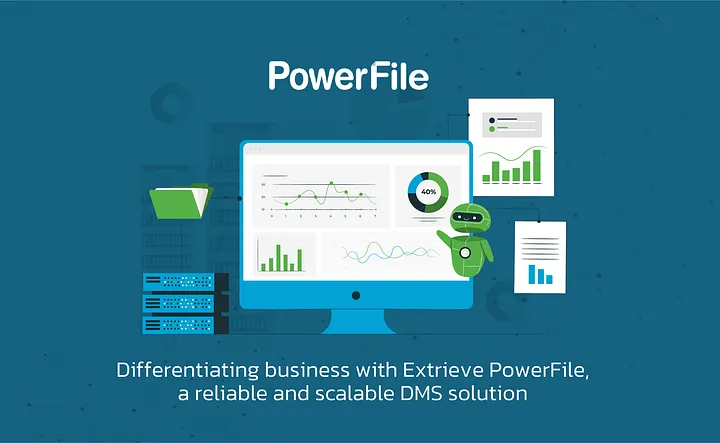PowerFile DMS stands out as a next-generation solution, offering features and capabilities that far surpass those of legacy DMS systems. Here’s why PowerFile DMS is unique and futuristic:
| Features | PowerFile | Legacy DMS |
|---|---|---|
| Organizing Structure (monotony) | Designed for Digital record management | Based on Physical Storage approach – Cabinet – Folder |
| Security | Customizable access controls for each entity | Predefined set of access controls |
| Infrastructure | Compression from Source, Page wise transfer, optimized for lower infra | Not part as standard feature. |
| Document Completeness | Reconciliation-based process and entity-based minimum document validations | No built-in mechanism for ensuring complete documentation |
| Scalability | Support cloud and different storage type and design for higher scale | Designed for predefined storage types. |
Why DMS Needs to Evolve
In the early 2000s, e-commerce applications primarily used a folder or tree-based indexing system. Users searching for products had to navigate through categories to find the actual items. This cumbersome method has since evolved, allowing users to search for products using keywords and then apply filters based on type, category, manufacturer, price range, and more. However, many Document Management Systems (DMS) still adhere to outdated file management approaches. PowerFile by Extrieve is here to change that, positioning itself as the next generation DMS designed for the digital age.
Despite advancements in technology, many traditional DMS platforms still use the outdated cabinet-folder model, mirroring the early e-commerce systems. This method, initially designed for physical document management, no longer meets the demands of modern digital environments.
PowerFile’s Innovative Approach
PowerFile revolutionizes document management with its entity-based storage approach, offering a more efficient and user-friendly system for managing digital documents.
Entity-Based Organizing approach:
- Customizable Archive Types: Create specific archives such as Employee, Loans, Accounts, etc., tailored to organizational needs.
- Dynamic Descriptors: Configure search parameters and document attributes based on the entity.
- Simplified Management: Streamlines the planning and implementation of DMS, making it easier to manage and maintain.
Major Advantage of this approach
Efficiency and Accuracy:
- Validation Checks: Ensure all required documents for each archive type are present, improving accuracy and completeness.
- Enhanced Flexibility: Users can configure descriptors and search parameters, allowing for a more tailored document management experience.
Operational Benefits:
- Simplified Planning: The entity-based model simplifies the setup and ongoing management of the DMS.
- Scalability: Designed to handle high volumes of documents securely and efficiently, meeting the needs of growing enterprises.
Why PowerFile Excels compared to Legacy DMS.
DMS monotony (Organizing Structure)
- PowerFile: Built specifically for digital record management, PowerFile uses an innovative entity-based storage approach, making it easier to organize and retrieve documents based on entities such as Employee, Loans, and Accounts.
- Legacy DMS: Follows an outdated cabinet-folder model, originally designed for physical document management, which is less efficient for modern digital needs.
Security
- PowerFile: Offers customizable access controls for each entity, providing tailored security settings that enhance document protection and user-specific access.
- Legacy DMS: Uses a predefined set of access controls, which may not be as flexible or comprehensive as needed for diverse digital environments.
Infrastructure
- PowerFile: Features advanced infrastructure capabilities such as compression from the source and page-wise transfer, optimized to reduce infrastructure requirements and enhance performance.
- Legacy DMS: Lacks these advanced features as standard, potentially leading to higher infrastructure costs and inefficiencies.
Document Completeness
- PowerFile: Designed with reconciled workflow processes and entity-based validation that ensure document completeness.
- Legacy DMS: Requires additional reconciliation and operational efforts to maintain complete documents.
Scalability
- PowerFile: Built to support cloud storage and on-premise storage types, making it highly scalable and adaptable to growing data needs.
- Legacy DMS: Typically designed for predefined storage types, which can limit scalability and flexibility in handling large volumes of data.
Conclusion
Extrieve PowerFile is not just another Document Management System; it is a pioneering solution designed to meet the evolving needs of modern enterprises. By moving beyond the outdated cabinet-folder model and embracing an entity-based approach, PowerFile offers a next-generation DMS that is more efficient, accurate, and user-friendly.
Experience the future of document management with PowerFile. Start digitizing your confidential documents today and enhance your operational efficiency with secure and innovative document management solutions.
For more information, download our brochure or contact us at globalsales@extrieve.com.






